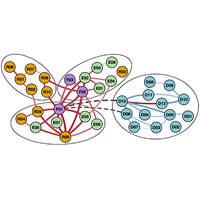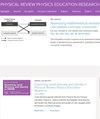通过不同人口群体的经验对研究生课程支持结构进行网络分析
IF 3.6
2区 教育学
Q1 EDUCATION & EDUCATIONAL RESEARCH
Physical Review Physics Education Research
Pub Date : 2024-08-05
DOI:10.1103/physrevphyseducres.20.020106
引用次数: 0
摘要
物理研究生课程的学习是学生个人、院系和高等院校共同努力的结果。了解导致学生成功和流失的因素对于改进这些项目至关重要。最近开始研究的一个因素是与支持结构相关的广义学生体验。学生体验量表(Aspects of Student Experience Scale,ASES)是一项李克特(Likert)风格的调查,由研究人员开发,目的就在于此。在本研究中,我们利用李克特式调查(NALS)的网络方法,对明确界定的人口群体对 ASES 工具的反应进行了独特的解释。我们研究了 NALS 主题的稳定性,并调查了这些主题在基于人口统计的网络中是如何表达的,从而证实了我们研究结果的有效性。我们发现,就最初 ASES 研究的所有四个主题而言,某些主题趋势能够捕捉到学生在不同人口统计网络中的不同经历。我们还发现,对于某些人口群体而言,原始主题之间存在着有趣的相互作用和混合。最后,我们的研究展示了 NALS 如何应用于其他李克特式数据集。本文章由计算机程序翻译,如有差异,请以英文原文为准。

Network analysis of graduate program support structures through experiences of various demographic groups
Physics graduate studies are substantial efforts on the part of individual students, departments, and institutions of higher education. Understanding the factors that lead to student success and attrition is crucial for improving these programs. One factor that has recently started to be investigated is the broadly defined students’ experiences related to support structures. The Aspects of Student Experience Scale (ASES), a Likert-style survey, was developed by researchers to do just that. In this study, we leverage the network approach for Likert-style surveys (NALS) methodology to provide a unique interpretation of responses to the ASES instrument for well-defined demographic groups. We confirm the validity of our findings by studying the stability of the NALS themes and investigating how they are expressed within demographic-based networks. We find that for all four themes in the original ASES study, certain thematic trends capturing students’ experiences vary across the demographic-based networks in meaningful ways. We also reveal that for some demographic groups, there is an interesting interplay between, and mixing of, the original themes. Finally, our study showcases how NALS can be applied to other Likert-style datasets.
求助全文
通过发布文献求助,成功后即可免费获取论文全文。
去求助
来源期刊

Physical Review Physics Education Research
Social Sciences-Education
CiteScore
5.70
自引率
41.90%
发文量
84
审稿时长
32 weeks
期刊介绍:
PRPER covers all educational levels, from elementary through graduate education. All topics in experimental and theoretical physics education research are accepted, including, but not limited to:
Educational policy
Instructional strategies, and materials development
Research methodology
Epistemology, attitudes, and beliefs
Learning environment
Scientific reasoning and problem solving
Diversity and inclusion
Learning theory
Student participation
Faculty and teacher professional development
 求助内容:
求助内容: 应助结果提醒方式:
应助结果提醒方式:


